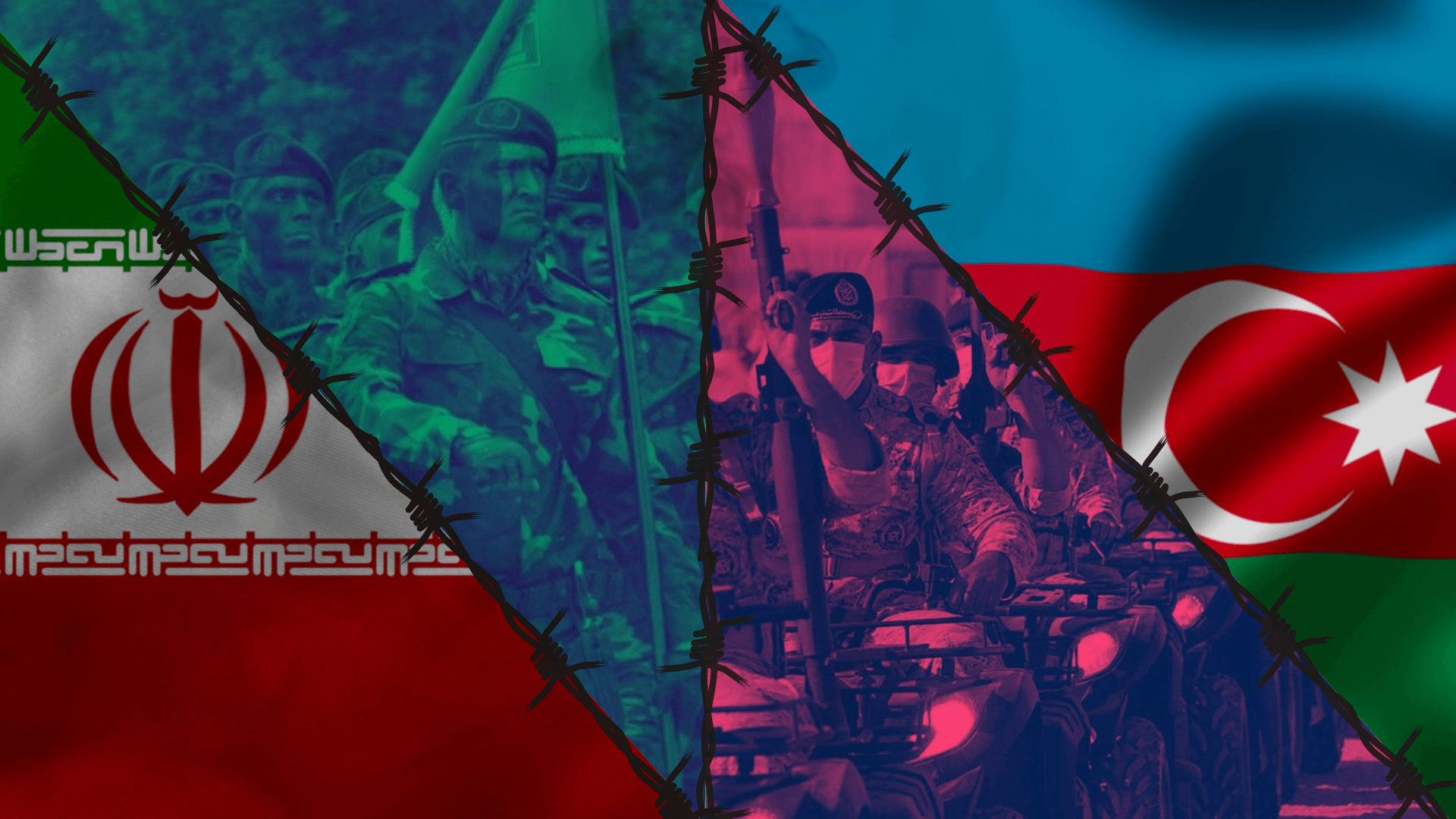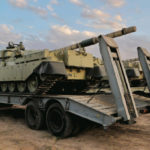Azerbaijan’s decision last month to levy customs tariffs on Iranian trucks crossing through its territory into Armenia, in addition to the joint military drills held by Azerbaijan, Turkey and Pakistan, as well as Iran’s response, have marked a new peak in the bitter tensions between Baku and Tehran, prompting mutual threats.
Iran faces accusations that it, in collaboration with Armenia, carried out provocative moves against Azerbaijan by sending help to Armenians living in the Nagorno-Karabakh region, which Baku regained from Armenia following last year’s bloody war.
A few days after the recent escalation between Baku and Tehran, a fresh crisis resulted in further tensions between the two countries, as Azerbaijan, Turkey and Pakistan held joint military drills in the Caspian Sea. Tehran deemed these drills to be a threat to its national security. Justifying its hostile reaction, Iran insisted that the agreements between the five nations overlooking the Caspian Sea stipulate that any military presence at any point is illegitimate.
Meanwhile, without making an announcement, Tehran on Sept. 19 mobilized its forces on the border with Azerbaijan, where they carried out drills involving heavy weapons and helicopters. Azerbaijani President Ilham Aliyev criticized Iran and questioned the significance of the timing of Tehran’s drills, especially as it had never carried out such exercises near Baku’s border since the latter’s independence from the former Soviet Union 30 years ago.
The military buildup between the two countries was accompanied by hostile rhetoric from Iran’s political and media apparatuses against Azerbaijan and Turkey, amid radical calls by some lawmakers for Tehran to annex Azerbaijan under the pretext that it was historically part of the Persian Empire’s territories and was “taken away” following the Russian Empire’s defeat of Persia in the 19th century.
In Baku, meanwhile, angry protesters attacked the Iranian Embassy in protest against Tehran’s threats. The Azerbaijani authorities also shut down the office of Supreme Leader Ali Khamenei’s representative and the biggest Shiite shrine in the capital. In response, Iran escalated further, prompting Azerbaijan to launch extensive four-day drills with Turkey in the border area of Nakhchivan.
The declared reasoning behind Iran’s escalation against Azerbaijan include the aforementioned levying of customs tariffs on Iranian trucks and Baku’s armed forces’ exhaustive inspections, especially after Iranian truck drivers were accused of hiding their own identification and instead using Armenian IDs and number plates. The other main reason was Iran’s concerns over the joint “Three Brothers” drills held by Azerbaijan, Turkey and Pakistan.
There are also as many, if not more, important undeclared reasons that have led Iran to escalate against Baku, primarily Tehran’s serious concern about the possibility of Azerbaijan making geopolitical changes, in coordination with Armenia and with the help of Turkey and Israel. These geopolitical changes revolve around Azerbaijan’s control over the Syunik region — a border strip between Iran and Armenia that Tehran considers its chief commercial corridor to Europe — in return for ceding some regions to Armenia in Nagorno-Karabakh.
This Iranian concern can be understood through the statement released by Iran’s Parliament, which expressed that any changes in the borders of its neighbors would be considered a red line for Iran.
Iran followed its threats with practical steps to find an alternative passage in case its relations with Azerbaijan deteriorate further and reach an impasse. Tehran embarked on consultations with Armenia over completing its Tatev road project, which would connect it with Armenia and Europe without the need to pass through Azerbaijan.
As a result of the massive support provided to Azerbaijan by Turkey, Pakistan and Israel in last year’s war against Armenia — let alone Islamabad and Ankara’s participation in Baku’s drills in the Caspian Sea — Iran forecast the formation of new regional alliances that would exclude it. These prospective new alliances would boost the standing and influence of Iran’s regional rivals: Turkey, Pakistan and Israel.
Some Iranian analysts have argued that the war between Azerbaijan and Armenia played a major role in shifting the balance of power in the region. Azerbaijan’s triumph in that war led Baku to respond by establishing new regional equations and alliances against Tehran. Due to these geopolitical considerations, Iran escalated against Azerbaijan to convey its dissatisfaction with the prospective new regional equation, which it feels Baku is marginalizing it from.
In addition to these considerations, Baku’s strong ties with Israel are a deep security concern for Tehran. Iran’s concern about an Israeli presence on its northwestern border stems from the great Israeli attention given to Azerbaijan — one of the strategically vital countries forging relations with Tel Aviv.
Due to Azerbaijan’s geopolitically important location, Israel maintains deep-rooted military and strategic relations with it, to the extent that Tel Aviv has a drone production line and a palpable military presence in the country.
Tehran sees that Baku is an important element in Israel’s strategic vision of encircling Iran, with the Iranian regime concerned that Azerbaijan may be one of the countries Tel Aviv could possibly use to launch strikes against its nuclear sites. Iranian officials have repeatedly warned Baku that it must not allow any country to use its territory to launch attacks against Tehran.
Also, Azerbaijan is a US ally in the Caucasus region and its delays to Iranian trucks heading to Armenia puts excessive pressure on Tehran in light of the sanctions imposed on it. For Iran, therefore, the truck crisis poses a massive threat to its strategy to circumvent US sanctions and ease the restrictions placed on its exports.
This current crisis serves the US policy of putting pressure on Iran and forcing it to return to the Vienna nuclear deal talks.
As a result of this recent Iranian escalation, it is likely to face certain ramifications, such as increased international isolation. This would further complicate Iran’s dire economic situation, which it has been suffering with since the former Trump administration pulled out of the nuclear deal in 2018.
During last year’s Azeri-Armenian war, the fingers of blame were pointed at Iran for supporting the Armenian army. Following Azerbaijan’s triumph and the protests staged by Iranian Azeris in solidarity with their ethnic group, Tehran was forced to announce its support for Baku’s right to reclaim its territories in Nagorno-Karabakh.
This means the continuation of the dispute between Iran and its northwestern neighbor may lead to Tehran’s Azeri minority expressing further ethnic sympathies toward Baku. The Azeri minority constitute a considerable percentage of the Iranian people. This could possibly increase the already daunting domestic challenges facing Tehran. Iran’s foreign foes could also exploit this fault line to put pressure on the regime and weaken it, moving the battle from the region to inside Iranian territory.
Tehran has created a new enemy on its northern border and is beset by an escalating and vicious cycle of domestic crises and disputes.
Dr. Mohammed Al-Sulami
In the end, it could be said that Iran is getting a taste of its own medicine after spending decades violating the borders of its neighbors and undermining their security and stability. Tehran has created a new enemy on its northern border and is beset by an escalating and vicious cycle of domestic crises and disputes.
In the Arabian Gulf, there are heightened tensions between Tehran and its Arab neighbors as a result of ongoing Iranian belligerency. On Iran’s eastern border, meanwhile, Afghanistan has turned into an arena for regional and international disputes after the US withdrawal and the Taliban’s capturing of power in the country.
Iran, whichever way it looks, domestically or abroad, is stretched to the limit and its future looks rocky.
By: Dr. Mohammed Al-Sulami – President of the International Institute for Iranian Studies (Rasanah). Twitter: @mohalsulami
Source: Arab News
***Show us some LOVE by sharing it!***



